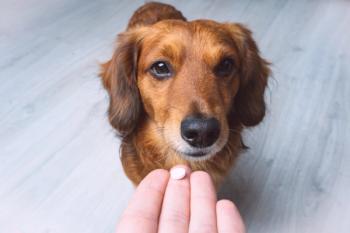
Effect of Postsurgical Rehabilitation in Spinal Cord-Injured Dogs
Does early intervention with intensive rehabilitation improve recovery in dogs with spinal cord injury after decompressive surgery?
Rehabilitation protocols are commonly used in canine patients with spinal cord injury, but objective, high-quality, evidence-based data regarding their effectiveness are lacking; published research is limited largely to retrospective data. Investigators at North Carolina State University recently
Study Design
In this randomized, blinded, prospective clinical trial, dogs 2 to 12 years of age weighing 20 kg or less with acute spinal cord injury due to intervertebral disk herniation were eligible for enrollment. Eligible dogs were either paraplegic with intact nociception or nonambulatory paraparetic, and had undergone decompressive hemilaminectomy. Duration of loss of ambulation could be no more than 3 days prior to admission. Dogs were assigned randomly to either the basic or intensive rehabilitation group. Both groups received inpatient rehabilitation for 14 days, followed by identical home protocols for days 15 to 42.
RELATED:
- Hemilaminectomy Versus Mini-Hemilaminectomy in Canine Intervertebral Disk Extrusion
- Stem Cell Therapy in Veterinary Medicine
The basic rehabilitation protocol for days 1 to 14 consisted of passive range of motion (PROM) and supported leash walks. The intensive rehabilitation protocol consisted of the following: days 1 to 14, supported standing followed by balance board activity once independently standing; days 1 to 5, neuromuscular electrical stimulation for 5 days or until the patient was walking independently; days 2 to 7, weight-shifting exercises for 5 days or until the patient was supporting its own weight independently, with the addition of balance board activity once supporting own weight; days 7 to 14, underwater treadmill exercise. The home exercise protocol for days 15 to 42 was identical for both groups and consisted of PROM and supported walks on a leash. Neurologic examinations and pain assessments were performed daily on days 1 to 14, and then on days 28 and 42. Gait was videotaped on days 1 (preoperatively), 3, 7, 14, and 42, and assessed using the previously published open field score and regularity index.
Results and Discussion
Thirty dogs met the inclusion criteria and completed the study (15 dogs in each rehabilitation group). Of these 30 dogs, 19 were nonambulatory paraparetic and 11 were paraplegic with intact nociception at the time of enrollment.
Rehabilitation exercises were very well tolerated by most dogs, with the exception of neuromuscular electrical stimulation, to which 5 of 15 dogs became intolerant over sequential treatments.
There was no significant difference in pain scores between groups at any time point (1, 3, 7, 14, 28, or 42 days). Likewise, there was no significant difference in any outcome measure between the basic and intensive rehabilitation groups, including time to ambulation; gait (open field score and regularity index), proprioceptive placing, thigh circumference, and weight change.
Clinical Impact
This was a robustly designed study. Intensive rehabilitation protocols were safe and generally well tolerated; however, no significant difference between the basic and intensive rehabilitation groups was evident. Based on these outcomes, performing the rehabilitation activities described in this study with the goal of improved outcomes or pain control is not justified. The potential effect of rehabilitation on patient enrichment during the postoperative period of exercise restriction was not evaluated and remains unknown.
Newsletter
From exam room tips to practice management insights, get trusted veterinary news delivered straight to your inbox—subscribe to dvm360.






